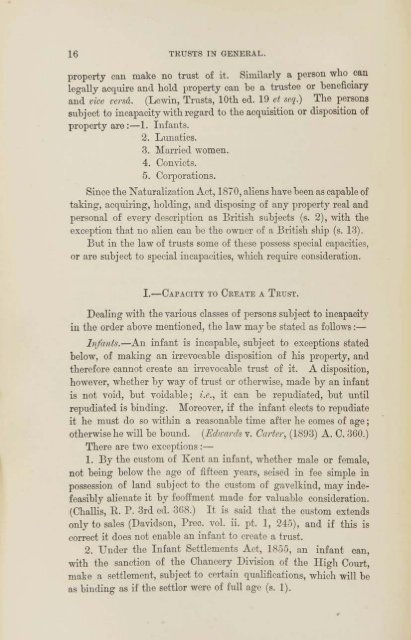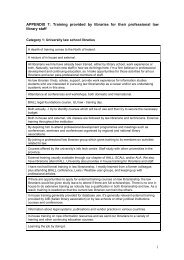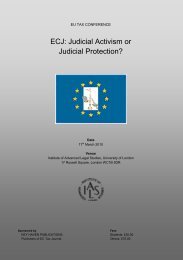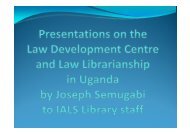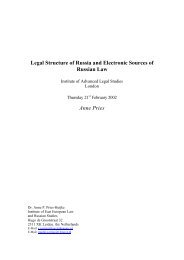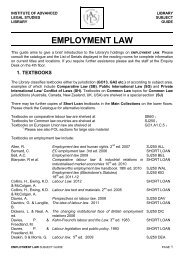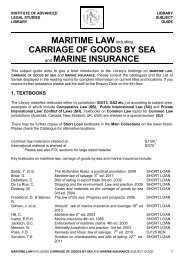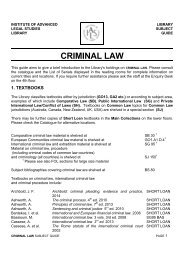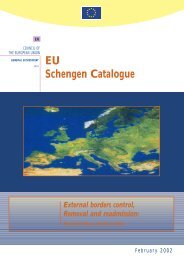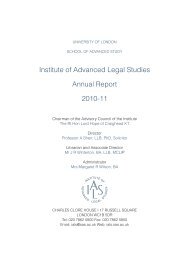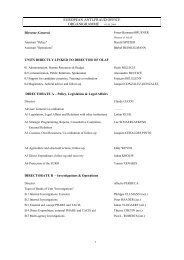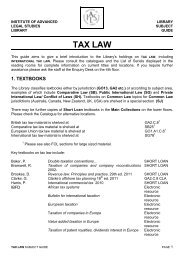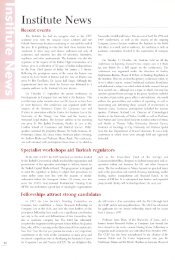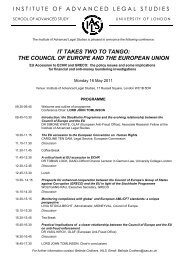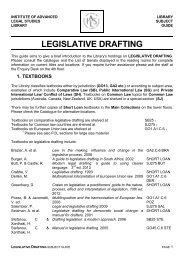a thesis - Institute of Advanced Legal Studies
a thesis - Institute of Advanced Legal Studies
a thesis - Institute of Advanced Legal Studies
Create successful ePaper yourself
Turn your PDF publications into a flip-book with our unique Google optimized e-Paper software.
16 TRUSTS IN GENERAL.<br />
property can make no trust <strong>of</strong> it. Similarly a person who can<br />
legally acquire and hold property can be a trustee or beneficiary<br />
and vice versa. (Lewin, Trusts, 10th ed. 19 et seq.) The persons<br />
subject to incapacity with regard to the acquisition or disposition <strong>of</strong><br />
property are :—1. Infants.<br />
2. Lunatics.<br />
3. Married women.<br />
4. Convicts.<br />
5. Corporations.<br />
Since the Naturalization Act, 1870, aliens have been as capable <strong>of</strong><br />
taking, acquiring, holding, and disposing <strong>of</strong> any property real and<br />
personal <strong>of</strong> every description as British subjects (s. 2), with the<br />
exception that no alien can be the owner <strong>of</strong> a British ship (s. 13).<br />
But in the law <strong>of</strong> trusts some <strong>of</strong> these possess special capacities,<br />
or are subject to special incapacities, which require consideration.<br />
I.—CAPACITY TO CREATE A TRUST.<br />
Dealing with the various classes <strong>of</strong> persons subject to incapacity<br />
in the order above mentioned, the law may be stated as follows:—<br />
Infants.—An infant is incapable, subject to exceptions stated<br />
below, <strong>of</strong> making an irrevocable disposition <strong>of</strong> his property, and<br />
therefore cannot create an irrevocable trust <strong>of</strong> it. A disposition,<br />
however, whether by way <strong>of</strong> trust or otherwise, made by an infant<br />
is not void, but voidable; i.e., it can be repudiated, but until<br />
repudiated is binding. Moreover, if the infant elects to repudiate<br />
it he must do so within a reasonable time after he conies <strong>of</strong> age;<br />
otherwise he will be bound. (Edwards v. Carter, (1893) A. C. 360.)<br />
There are two exceptions :—<br />
1. By the custom <strong>of</strong> Kent an infant, whether male or female,<br />
not being below the age <strong>of</strong> fifteen years, seised in fee simple in<br />
possession <strong>of</strong> land subject to the custom <strong>of</strong> gavelkind, may indefeasibly<br />
alienate it by fe<strong>of</strong>fment made for valuable consideration.<br />
(Challis, E. P. 3rd ed. 368.) It is said that the custom extends<br />
only to sales (Davidson, Free. vol. ii. pt. 1, 245), and if this is<br />
correct it does not enable an infant to create a trust.<br />
2. Under the Infant Settlements Act, 1855, an infant can,<br />
with the sanction <strong>of</strong> the Chancery Division <strong>of</strong> the High Court,<br />
make a settlement, subject to certain qualifications, which will be<br />
as binding as if the settlor were <strong>of</strong> full age (s. 1).


